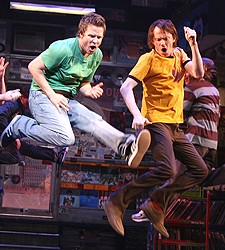 As I predicted earlier, a youth-oriented new musical like Spring Awakening is going to have trouble in today's Broadway market. Michael Riedel follows up his previous High Fidelity pre-postmortem with a look behind the scenes at this more promising and better respected effort. Riedel goes to bat for Spring, but is frank about their weak advance sales, and their marketing dilemmas.
As I predicted earlier, a youth-oriented new musical like Spring Awakening is going to have trouble in today's Broadway market. Michael Riedel follows up his previous High Fidelity pre-postmortem with a look behind the scenes at this more promising and better respected effort. Riedel goes to bat for Spring, but is frank about their weak advance sales, and their marketing dilemmas.
The producers - all 35 of them - have been wracking their brains to come up with a marketing campaign that will lure both traditional theatergoers, who might be put off by the raw sexual themes, and people in their teens, 20s and 30s, a group that generally shuns musicals as hopelessly unhip. So far, they haven't cracked the code.
Says a production source: "We're chasing an audience that doesn't go to the theater. They're elusive. And the older crowd that goes to the revivals doesn't know what this show's about. It's a real challenge."
The struggle has led to spirited debates among the producers, sources say. One camp wants to tout the show's edgy sexuality; another wants to project a gentler image of romance and coming of age.
So the dilemma is, how to appeal to one group without turning off the other. Especially hard since part of what will deter one group is the sheer presence of the other. Hipsters don't want to see a sexy rock musical alongside their grandparents and the old guard doesn't want to dress up, pay hundreds of bucks for a night at the "theatah," and find their view obstructed by someone's nose ring.
Unfortunately for
Spring Awkanening, both groups have to come--plus a whole lot of other people--and be willing to shell out upwards of $75 for the experience.
(Riedel's not kidding about the 35 producers, by the way. He wrote an earlier column about how they've had to hire a separate "producer wrangler" to protect the small group of original "lead" producers from all the others--who are basically the moneymen & moneywomen. God help the stage of Radio City should this show ever win Best Musical at Tony time.)
Here's a great example of the conundrum faced by the quixotic team:
The split has even flared up over the show itself. During previews, a couple of producers argued that the end of Act I, in which a teenager is forcibly seduced by her boyfriend, should be toned down. These producers wanted a kiss rather than a near-rape.
They didn't prevail, though, and "Spring Awakening" - which played off-Broadway's Atlantic Theater last season - hasn't been Disneyfied for Broadway. But the ad campaign seems to be navigating the middle ground. The poster art depicts a boy on top of a girl (who's showing a bit of flesh above her stocking). It's the sex scene, but it looks more like a first kiss.
"For a show that really pushes the envelope, there is no edge," a top theater
executive says.
No edge, yes. And younger audiences can smell fake edge a mile away. Hence no one under 30 will go see High Fidelity.
I'm fascinated by the debate over this particular scene, though, since in Wedekind's original play, the moment is explicitly written as a rape. The musical however (which I saw in the Atlantic Theatre run) omits Wendla's cries of "Don't, don't!" so for my money it already tones things down, and, what's more, leaves the impression that the groping is consensual. Maybe what people are really complaining about is the "boob flash" as Melchior feels her up and the actress exposes a breast. So, despite the de-fanging of Wedekind, I'm sure I'm not the only one who thought--when news of the Broadway move was announced--
hmm, that will be one strange first act curtain on Broadway.
I predict that Spring Awakening will get very good,
respectable reviews. (That's if the critics don't concluded the little Off-Broadway show doesn't fill the big theatre.) But will they be
money reviews? That's what a show like this needs, with no stars, and only a tepid soft-rock score as its calling card. The producers hope it can be the next
Rent--but the Rent success is hard to repeat. If you remember back in '94, it had
incredible buzz at New York Theatre Workshop. (And let's face it, the horrible story of Jonathan Larson dying made for great press.) A day didn't go by without hearing about all the celebs lining up their limos along East 4th street to get a peak.... Plus, Rent had much better hip cred. It may have been the La Boheme storyline, but no one cared, since they wisely dressed it up like the East Village. And it was about AIDS, so pretty current. While I love late-19th century German drama as much as the next guy (ok, more than),
Spring is at a disadvantage because of the foreigness of names and setting, no matter how much bop & groove Duncan Sheik can supply. This is not to say Spring Awakening isn't
good. I think almost anyone who's seen it can attest to it being first-rate work, even if it isn't to your taste. (I myself am in that mall camp whose only gripe is it's not as good as Wedekind.) But from the p.o.v. of a producer, this seems like a huge gamble.
As I said in the earlier post, keep an eye on
Spring,
Grey Gardens, and
Company. Their fortunes this season will be a very interesting test--a barometer--of where the Broadway audience is at these days. The future of the more sophisticated, adult tradition of musical theatre on Broadway lies in the balance.












